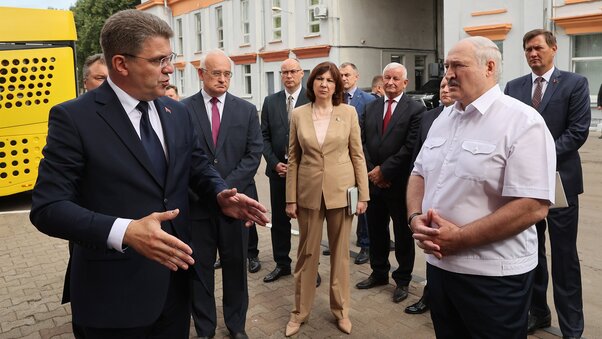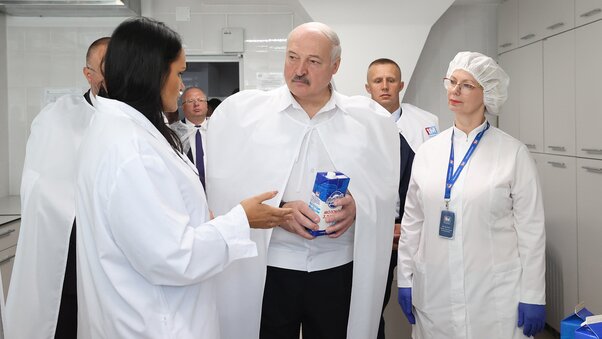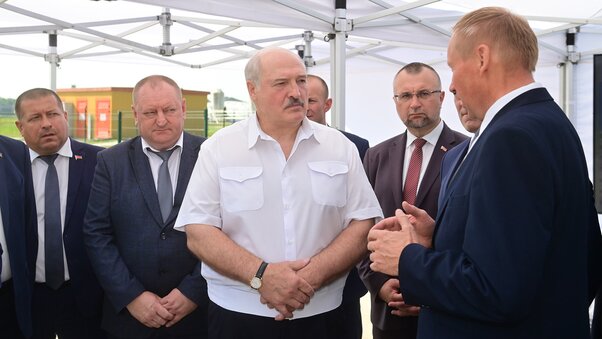Working trip to Smolevichi District, Minsk Oblast
- 26
- 13:09
Belarusian President Aleksandr Lukashenko continued his trips to the regions to assess the situation in agriculture. The president went to Smolevichi District, Minsk Oblast, on 16 August.
Aleksandr Lukashenko told reporters how he chooses where to go on regional trips as he inspected the selection and seed complex of the Scientific and Practical Center for Arable Farming of the National Academy of Sciences of Belarus (NASB).
“We have already got a barrage of requests from people asking why the president is not coming to their community and so on. After all, there are thousands, thousands of such communities that we are asked to visit for various reasons. Some people want us to come because our visits help fix some issues. Some want to see the president, others want the president to see something. I should say that I will not be able to visit all these places as there are several thousands of them. Probably, it will not be right if I hopscotch from one place to another randomly. I choose to visit those places where I can see something new,” Aleksandr Lukashenko said.
The president recalled his recent visit to Myadel District. Over there abandoned lands were reclaimed to agriculture and a solid agricultural company was created from scratch. The head of state plans to visit one of agricultural companies near Grodno: “The governor wants to amaze us with something. Let’s see what he has in store for us.”
“In other words, if there is something new, we need to highlight it. And not just to show it to me, but to introduce it throughout the country,” Aleksandr Lukashenko emphasized. “If you have got something that we have not seen before, we will come to check this out and we will build on this experience,” the president added.
In Smolevichi District the head of state studied the work of the Scientific and Practical Center for Arable Farming of the National Academy of Sciences of Belarus. The center specializes in the selection of crops and production of original seeds. “There is nothing like this anywhere else. Any state in the world can envy this. Therefore, if you have something new, we will be there tomorrow to scale it up throughout the whole country,” the head of state said.
Aleksandr Lukashenko noted that for a high harvest it is important to observe the technologies in the strictest manner. In some places this is still not done, including because of the negligent attitude to the results of common labor. He noted that farmers treat their grain differently. "They treat it differently. They abide by technology. They are in the field working all the time. Meanwhile managers of state-held agricultural companies hold staff meetings and consider their job done," the head of state said.
"We need dictatorship. And we have it. Let's turn it on,” the president put it figuratively. “Let's turn on the administrative resource and make people work properly. It's time to start working really hard."
In the fields of the scientific and practical center, the conversation was about the cultivation of legumes. For example, lupine is a crop rich in protein, which is extremely important as part of the feed for animal husbandry. Aleksandr Lukashenko inquired scientists and officials about the work and prospects in this direction. Moreover, it is also a matter of import substitution.
Another fodder crop is alfalfa. The head of state was briefed about its cultivation and use. Soybeans in Belarus are practically not cultivated, but farmers have an eye on it.
Alexander Lukashenko listened carefully to the reports on the advantages of these and other crops, instructing to test the suggested approaches in practice in the presidential experimental fields next year.
"We must try and see. If we see that it works, we will implement it faster," the head of state emphasized.
Aleksandr Lukashenko asked the scientists whether it makes sense to expand the area under sunflower crops in Belarus. After all, this is about import substitution, as Belarus has to import sunflower oil.
The head of state said that on his way to Smolevichi District he passed a sunflower field. “I cannot say how good the yield is going to be, but this sunflower crops look very good,” he noted. “We need to cultivate sunflowers. Why do we import sunflower oil? Why cannot we produce our own sunflower oil and use sunflower meal as animal feed?” Aleksandr Lukashenko asked.
Sunflower fields can be expanded at the expense of corn fields. Yet if all the necessary technology is observed, the yield in the remaining areas should not drop. At the same time, Deputy Prime Minister Leonid Zayats suggested focusing on rapeseed and production of rapeseed oil. In his opinion, it can make more economic sense and is less risky.
Aleksandr Lukashenko gave an instruction to test sunflower crops on the president’s experimental fields in order to make a final decision. “We need to give it a try. And after that we will make up our mind whether we will produce it on a mass scale or not,” the head of state said.
The same way Belarus once tried to grow winter crops. These crops showed good yields and the experience was scaled up throughout the country.
The cultivation of flax which Aleksandr Lukashenko often calls a ‘political crop’ was also discussed in detail.
“There is some progress. This year the yield has improved, although insignificantly, notwithstanding the fact that it was not an easy year for flax,” the president noted.
He urged heads of agricultural enterprises to allocate good land for growing flax, as this will be very instrumental in improving the yield. The head of state promised to revisit the issue in autumn during his trip to Orsha Linen Mill.
Aleksandr Lukashenko instructed the Agriculture and Food Ministry to take action and urged the ministry to wake up from slumber. The ministry has about the same number of people on the staff as the government does. The head of state called the ministry to get involved more deeply in the situation on the ground.
“Therefore, write down a detailed plan for planting winter soybeans, peas, lupins, and so on,” the president said instructing Agriculture and Food Minister Igor Brylo. “Yet, technology is above everything. If technology is observed, you will need less area,” he added.
The head of state inspected the fields that are used to breed new varieties of wheat and leguminous crops. He also visited the production site for the refinement of seed material of the scientific and practical center.


